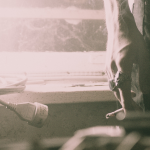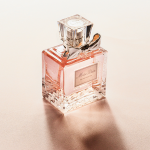A warm breeze passes through the hotel window and stirs the gauze curtains. For a moment I can see the bright coastline across the bay, a curve of coloured lights sparkling in the last blue light of day. The lights fade as the thin fabric of the curtains ripples and then settles again.
My wife groans. Soft yellow lamplight illuminates her shape, naked beneath the bedsheet. A wet cloth covers her eyes.
“Should I go?” I say.
“It’s up to you,” she says.
“Tell me what to do,” I say.
“Just go,” she says. “It’ll pass.”
Her breathing slows and the cloth slips from her eyes. I pull the bedsheet over her shoulder and pick up the jacket she gave me, a gift for our anniversary. It’s a little tight around the chest, but the material is light and cool.
I close the door and leave.
This is our place. It’s where we met, where we married seven years ago. We loved the history. The charm. The fact that the city was once an island, but is now connected to the mainland by a narrow isthmus. Two lands reaching out to one another, a bridge between them.
I find myself down by the water again, heading toward our favourite restaurant. I’m not hungry, so I take a stool at the bar. Removing my jacket, I order an Old Fashioned and check my watch.
At eight o’ clock, the man enters. I see him in the mirrored wall above the bar. He goes to this same restaurant every night. He wears the same suit, sits at the same table, orders the same food. Every night, the same.
The concierge offers to take his coat, but the man shakes his head and puts a hand over his breast pocket. A waiter introduces himself, scribbles in his notepad, and leaves.
The table is pushed up against the wall, right under the window, looking out across the water. The man pulls the table out, turns it ninety degrees, and moves the chairs so that one is facing the window and the other is looking into the restaurant. He brushes his hand across the chair facing the window and adjusts its position. Then he sits down in the other chair while the waiter pours two glasses of red wine, one for the man and one for the empty seat.
The man touches his glass to the other and takes a sip. I’m looking at him in the mirror and our eyes meet, so I shift my gaze to the window behind him. In the distance, a small ferry packed with tourists casts off from the harbor. The ferry gathers speed, sailing away from the old town toward the glittering lights across the bay.
The waiter returns with a plate in each hand. He places one plate on the table in front of the man, and the other in front of the empty seat.
Reaching over, the man lifts the plate and sets it beside his. He removes the tomato from the salad and arranges the slices on his own plate, then takes the olives from his and adds them to the other. After he’s done, he puts the plate back and starts to eat.
A musician appears and weaves between the tables. He’s playing the violin while a woman follows behind, singing in some other language. I don’t know, I can’t understand.
The man stops eating, lays down his cutlery, and covers his face with his hands.
I’ll go over and talk to him. I’ll introduce myself and shake his hand. My hand will be in his hand. He might hold my hand there for a while. Maybe he’ll invite me to sit with him, and he’ll tell me something.
Through the window, the ferry reaches the large port of the new town and the passengers disembark.
The violinist stops at the table next to the man and serenades a young couple. They stand and begin to dance. The man looks at the couple and then turns away as they kiss.
The restaurant is filling up. They’ve had to bring in extra tables. People are standing around and waiters are hurrying back and forth. It’s too loud in here. Too crowded.
I wedge a few bills under my glass, nod to the bartender, and leave.
Outside, the salt-heavy air sharpens the residue of whiskey in my throat. It burns. Beyond the restless sea, the coastline sparkles against the dimming twilight.
I’m looking at the lights when the man walks up beside me. He’s holding my jacket.
“You forgot something,” he says.
My hands are in my pockets.
“I don’t know,” I say. “It’s a little tight.”
He folds the jacket over his arm and smooths it down.
“It’s a nice jacket,” he says, “Where you headed?”
There are two boats waiting, one either side of the pier.
“I don’t know,” I say.
The ferrymen stand on the pier and share a cigarette.
“I’m staying in the old town,” he says.
“The same,” I say.
“Those lights sure are bright, though.”
He looks out over the water and his eyes mist over. He covers his breast pocket with his hand. I wait for him to tell me something.
One of the ferrymen calls out to us, but I don’t understand. He raises his arms, points to the old town and the new.
I take my hands out of my pockets. The man offers my jacket.
“I’d hold onto this, if I were you,” he says, and heads back into the restaurant.
Slipping my arms through the jacket, I step onto the ferry to the old town.
The boat crosses the water toward the harbour. As we approach the town, I think of my wife. The curve of her body beneath the bedsheet, her hair scattered over the white pillow, her lips parted.
I think of the breeze passing through the open window. How the curtains ripple and then settle again.
…
Biography
Christopher M Drew is a writer from the UK. His work has appeared online in SmokeLong Quarterly, Literary Orphans, Third Point Press, MoonPark Review, and Flash Frontier. He has a short story chapbook, ‘Remnants’, forthcoming from TSS Publishing in 2019. You can connect with Chris on Twitter @cmdrew81, or through his website cmdrew81.wordpress.com.
Image: unsplash.com





